If it be your will
That a voice be true
From this broken hill
I will sing to you
~ Leonard Cohen
In one of my former lives, I worked as a disc jockey on a classic rock station in Denver, Colorado, a major market. I used a fake name for my radio personality, and I think it can be helpful to adopt a persona; it’s a form of voice. When I talk about voice as I’m going to do here, I’m not saying we can’t adopt a persona for purposes of entertainment or otherwise. Rather, I’m going to talk about my experience with voice as related to aligning with my true or original self.
What is it? How do we find it? The struggle to find our true voice is a profound journey many of us embark on, filled with uncertainty and self-discovery.
Writers, actors, performers, and entertainers pull from many voices. Think of comedians who do impressions. For me, imitation was a form of mimicry I was especially good at from an early age. I unconsciously picked up on others' way of talking, mannerisms, and quirks. I was a natural, and it served me well.
I created a persona for my radio show, and I guess that’s what I’m doing here on Substack. Who’s writing this? You tell me. But seriously, if I have a persona here, it’s this: I’m what’s left of a real cool chick here to tell you you’re okay and always have been. I’m talking to you, and I believe you’re listening or reading me because something tells you it’s true.
I believe anyone who digs deep and does the work it takes to know themselves, really know themselves, will discover there’s nothing wrong with them, and there never was. I’m here to point you toward the truth inside you, not to tell you what it is, but how to get there. How will I do that? By sharing how I got there and using my voice.
My radio persona, ironically, was based on being genuine before authenticity became a thing. And ironically, I lost myself in that persona. The conflict between what I presented myself to be, i.e., my radio persona, who I’d been taught to be, and my original self, which I was disconnected from, along with the incongruence I felt related to the public’s perception of me, was complicated. I came from a black-and-white world and had no clue how to find my bearings outside it.
There’s that thing where writers are instructed to imitate other writers as an exercise in, I don’t know, style? George Saunders talks about trying to emulate Ernest Hemingway until he realized he could only write like George Saunders. I never took to that technique as a writer. I haven’t tried to imitate other writers’ styles, but my reading influences my voice, which is how I learned and continue to learn to write. As a radio personality, if I imitated anyone, it was the high-energy male jocks I heard on Top 40 radio; upbeat but add warm and friendly to my shtick instead of obnoxious and antagonistic. It was the mid-seventies, and as a woman, that’s what made my voice unique.
Remember, though, I was raised in a cult. So how did I manage the inner conflict between who and what I’d been taught to be and the wild girl on the radio, voice sexy with cigarettes, playing rock and roll, and dancing to the beat? How did I reconcile the little religious girl I’d been raised as with the music director being wined and dined by record reps? I didn’t. All those voices in me competed just below the level of consciousness.
The little religious girl morphed into its opposite, a rebel. Rebelling is no more of a choice than conforming is. They’re both reactions. One of my sisters conformed. She stayed in the cult, professed they called it, up until her mid-thirties. I didn’t. Professing meant dressing in modest, old-fashioned, styleless clothing, keeping your hair long and up in a bun (if you were a woman), and attending home church meetings a minimum of twice a week. I’m pretty sure she didn’t know any more about her original self than I did. Or that she was anything other than what her circumstances taught her. For her, survival meant going to church and following its edicts. For me, survival meant defiance.
Indoctrinated in extreme fundamentalism, I had to find my way out of the labyrinth of conditioning that shaped my mind. But I did not know this.
I only knew the instinct that drove me from within toward something different, something other than where I came from. Something out there. Somewhere.
I was seeking answers, but it took forever to realize that what I was looking for was the 'me' behind the cult, my parents, and society’s projections. I was buried beneath layers of untruths and dogma, beneath the person I was told to be. It was a process of learning who I was not. I had to peel away the layers of conditioning, the false identities I had adopted, to reveal the authentic 'me. ' It was only with subtraction, not addition, that who I am began to emerge. And I can tell you, it’s not easy to say who that is.
This is where voice comes in. Voice is emergence.
There are techniques designed to help one find one's voice as a writer or performer. On social media, for example, we talk about being on brand etc. But that’s not the voice I mean or care about. Voice, in that sense, was easy for me because I had learned since birth to adopt a persona, or personas, to survive. To some degree, I guess that’s part of ego development. For those raised in dysfunctional or abusive situations, being forced into a false persona to meet the needs of the system distorts that development.
Although I didn’t know it, I was looking for my voice. As layers of conditioning and the false personas, the masks I wore for survival, fell away or were stripped off, I connected more and more with a force inside me, unexpressed feelings long denied, unrecognized, and buried.
I came to voice by speaking.
At the age of thirty, I was introduced to my feelings in a treatment center for addiction. Until then, I didn’t know I had any but the most rudimentary feelings, usually sentimental, nostalgic, and fantasy-based, all attempts to feel what I must have sensed was missing. Counterintuitively, substance use helped me feel rather than suppress my emotions, which is a common misconception. I didn’t know I needed anyone or anything. I didn’t know I was afraid. Anger was so remote it came out as disconnected drama. Don’t diagnose me. I was raised in a cult.
You may not have been raised in a cult, but you were still conditioned by many factors: geography, class, gender, race, and sexual orientation, to mention a few, determine the ways your mind and beliefs were shaped. Pile on parents, your ancestors (generational), religion, teachers and education (private or public, home school, or none), peers, culture, etc.
I have learned to speak even when my voice shakes.
I have come to believe over and over again that what is most important to me must be spoken, made verbal, and shared, even at the risk of having it bruised or misunderstood. ~ Audre Lorde
That’s how I found my voice. I had to use it.
Decades ago, I sought help for “a little cocaine addiction,” which resulted in the awareness that I had a substance use disorder. In treatment, I received an introductory lesson on how to name my feelings. What did I feel in my stomach? I learned I was probably scared, anxious, or afraid if my stomach clenched or hurt. Now, if it goes from that to hollow, and I can’t catch my breath? That is terror. Mostly, in the beginning, I didn’t tap into the big feelings like terror. I’d been disconnected from myself and my feelings forever, and I didn’t feel them.
I started small and began to identify when I felt sad, angry, afraid, or excited (often confused with fear.)
But the key? I had to say it.
The Feelings Circle: A Genius Chart for Better Communication`
I’m writing my fifth post, maybe the 5th draft, for you to read, and I’m both a little scared and excited right now. On top of that, I feel this thing I now know to call desire.
Yes, desire. Desire is not exactly an emotion, but our feelings can arise from desire, or desire can arise from feelings. I could not clarify my desires until I learned to identify my emotions. But even more profound, I tapped into desire as the primary motivator and source of my passion, its connection to my life force; it is my GPS and guides me toward what is most true and in alignment with who I am.
Asking myself what my motives are is crucial. When I’m motivated by fear, that’s a sign to step back.
I did not know what desire was because it was discouraged and denied in childhood. In hindsight, that desire, or what I wanted, steered my life regardless. I lived in a desert of emotional and cultural deprivation, absent of want, disconnected from desire. I learned that wanting was sinful and shameful—shades of Eve in the Garden of Eden, who wanted an apple.
To name something is to bring it into being, and since I had no language to name my feelings or desires, I could not experience them.
As the child of a cult, I was denied a private language, which essentially means I was denied a self. I learned that wants and needs were connected to the flesh. And I was taught to deny the body before I knew I had one. My voice was silenced before I learned to talk.
What is this sensation I feel right now pushing up from just beneath my heart and into my chest and throat, down my shoulders, through my upper arms, forearms, hands, and out my fingers? Desire. I am writing these words alone. I want to speak. I want to reach a place in you that is like the place in me. I want to say the unspeakable to you and, by your reading, know that you know it too.
What is this need to speak? What is this burning heart I feel?
Why is voice elusive?
Techniques won’t get us there.
What will? Attention. Being.
And how do I be?
For me, it started with tuning into and paying attention to my body, which I was so disconnected from that I completely ignored it until the pain of not feeling became so great I ended up in a treatment center for addiction at the age of thirty. My body, heart, and head had to find their way to each other, which would take decades.
First, I had to stop trying to find my feelings in a bottle, a line, a pill, or a needle. Others may look for them in sex, food, work, or perfection. They were inside me, not out there.
That’s how I found out I’m here.
VOICE. Voice is how we find ourselves.
If it be your will that a voice be true
From this broken hill I will sing to you
Every moment I use my voice, a little more of me comes into being. And with a little more of me, a little more of you. Because I wasn’t here without you.
One day, as I learned to speak, I realized I’d begun to trust myself. Then I realized I had not only found my voice, but I could hear it.
And because I can hear my voice, I can hear you.
I’m listening.
One Thing: Get this book
I wish Brene’ Brown’s book had been available years ago; it would have saved me a lot of angst. I can’t recommend it highly enough as a map for your feelings. I decided to look for Brene’ on substack. I didn’t find her, but I discovered this amazing feature by Post Traumatic Growth Weekly:
Receive a brilliantly crafted, actionable summary of a top rated psychology book straight to your inbox every Friday! 📚🧠 by Eleanor Carey
Here is Eleanor Carey’s summary of Atlas of the Heart. You can purchase the book at the link below:
Brown, Brene. Atlas of the Heart: Mapping Meaningful Connection and the Language of Human Experience. 1st ed., Random House, 2021.
Shout outs
Best read this week is by
! I Smell A Rat up at SLATE! Once we realize there’s nothing wrong with us and there never was, we are less vulnerable to quick fixes. I love the way Michelle rolls it out. Check out her substack, Sunday Drive, for more great writing!. “All those promises of healing seemed to float far out in the ocean, unreachable.”
There’s Nothing Wrong With You (ATNW) is now featured on SoberStack hosted by
of Sober Soulful. Excited to be in conversation and fellowship with writers spanning diverse ages, focus areas, and paths of recovery!Stay tuned for updates about that promised essay about scapegoats and family estrangement, tentatively titled I AM THE GOAT: A Love Story. It’s a bit long for substack and looking for a home, so it may take a while. I can’t wait for you to read it!







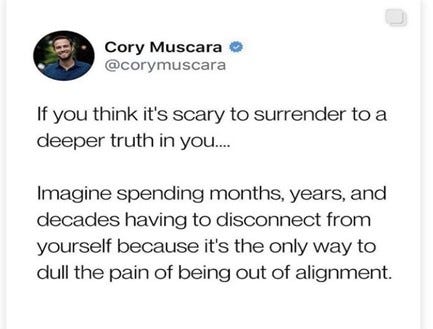
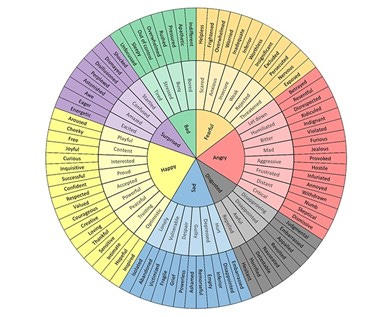
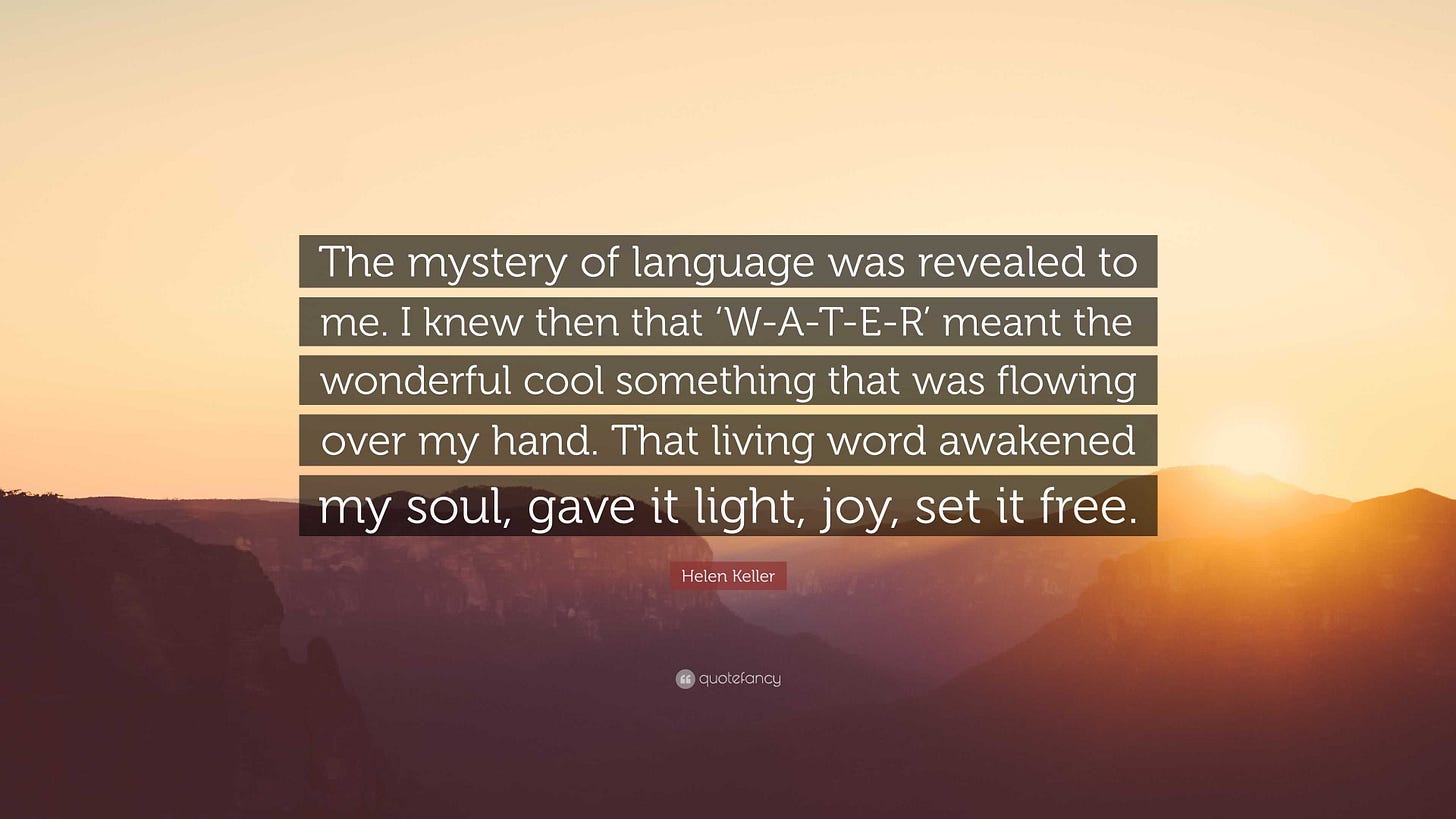
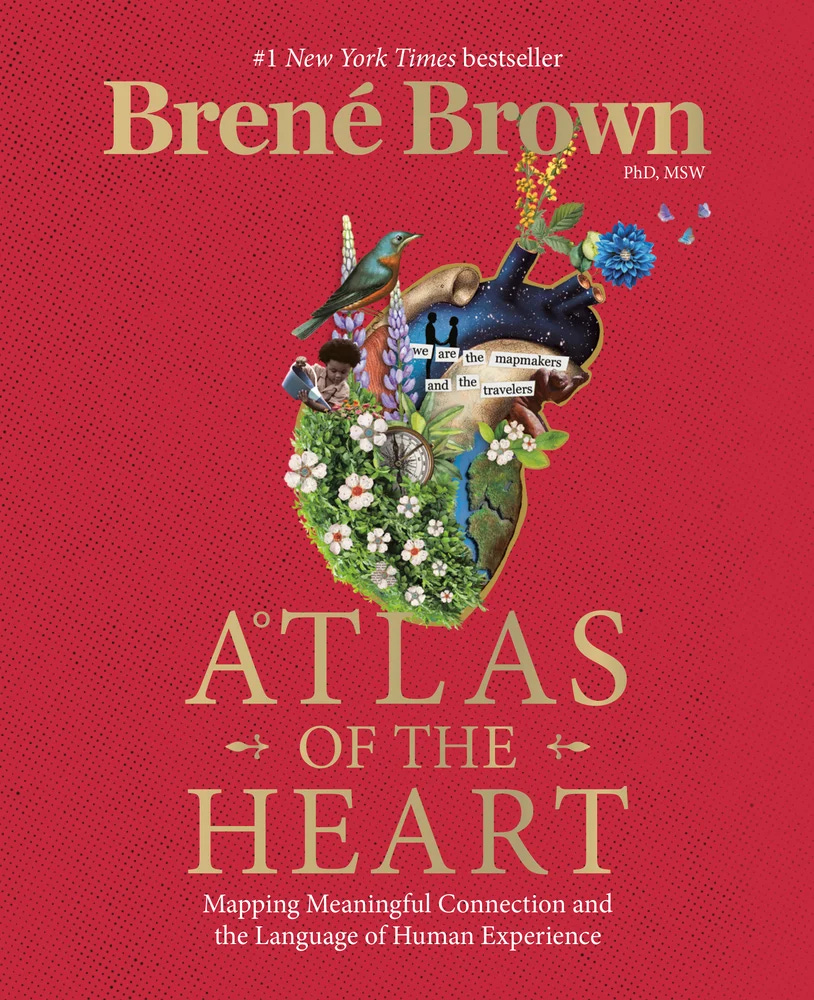

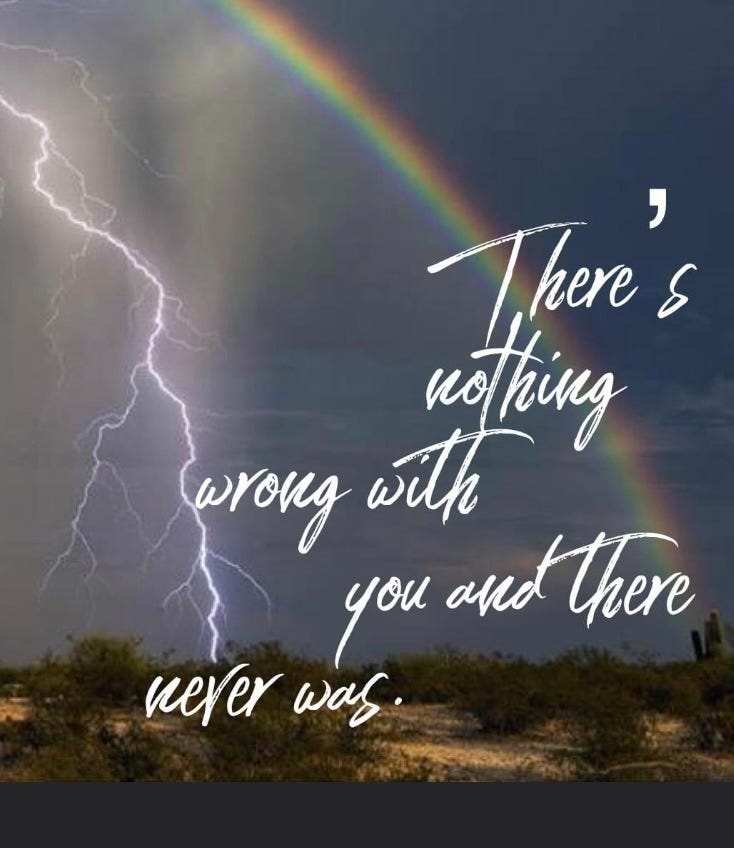
"I have learned to speak even when my voice shakes." That one is still hard for me. For a long time, when I tried to speak, to represent for myself, not only would my voice shake, but I would often cry. Standing up for myself, feeling feelings was so frightening and I was on such shaky ground for so long that it's taken a long time to courageously stand in my truth. And to do it consistently will take longer for me, but I'm on the right track. Love your writing, Kelly. You're an excellent teacher. xoxo
I just read this again. It’s so beautiful, powerful and true. Your voice comes through loud and clear when that’s the energy of the message you want to share and then it comes through soft and gentle when you’re dishing out a bowl of compassion. I think you’re an incredible creator.
And as an after note, I love Brene Brown and will order the book you recommend. Thanks, Kelly!